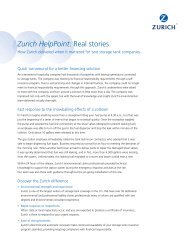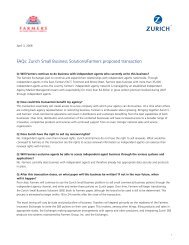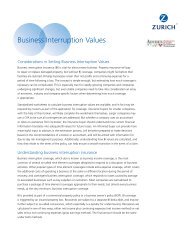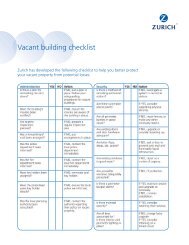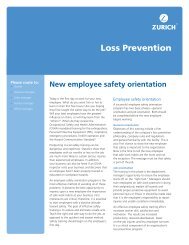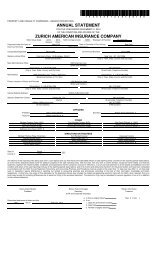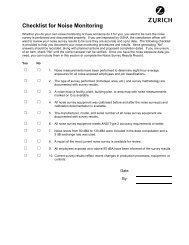Know the risks - Zurich
Know the risks - Zurich
Know the risks - Zurich
You also want an ePaper? Increase the reach of your titles
YUMPU automatically turns print PDFs into web optimized ePapers that Google loves.
Liabilities to third partiesLiability to borrowersCases brought by borrowers are often referred to as “lender’s liability” cases. Suchsuits are normally brought against <strong>the</strong> institution itself but, in certain circumstances,may be brought against directors as well. Some examples of typical “lender’sliability” cases are as follows:• A suit by a borrower against a loan officer alleging misrepresentation – for example,that <strong>the</strong> officer promised to extend more credit or to grant an extension of time andthat when <strong>the</strong> officer failed to do so, <strong>the</strong> borrower’s business suffered.• Improper foreclosure or sale proceedings, including allegations that a loan officerfailed to conduct a “commercially reasonable” sale.• Violation of federal or state truth-in-lending laws.• “Slander of credit” cases arising out of a loan or credit officer’s statements to athird-party that effects a borrower’s credit.• “Domination and control” cases. Lenders who exercise domination and control overa borrower’s business to <strong>the</strong> detriment of <strong>the</strong> borrower or persons dealing with<strong>the</strong> borrower may be liable for duress, economic coercion and interference withcorporate governance.• “Bad faith” or breach of implied covenant of fair dealing.Liability to employeesDirectors are subject to liability for violations of laws protecting employees againstunlawful discrimination based on race, age or sex, as well as wrongful terminationand sexual harassment. Naturally, when corporate officers participate in a violation ofan employee’s civil rights, <strong>the</strong>y face potential personal liability. However, even if notdirectly involved in <strong>the</strong> wrongdoing, directors and officers may be liable under stateand common law for claims related to wrongful discharge, retaliation, workplaceharassment, defamation, infliction of emotional distress, invasion of privacy, andnegligent hiring, training, or supervision. Federal class action claims pursuant to TitleVII typically can be brought only against <strong>the</strong> corporation as <strong>the</strong> employer and notagainst any directors or officers. While most employment claims can be resolvedon an individual basis for relatively small sums, claims brought by senior officerswith high compensation or lucrative stock options can be difficult and expensive todefend and resolve. In addition, directors face far more significant potential exposurewhen <strong>the</strong>ir board decisions are perceived to have negatively impacted a class ofemployees, such as with large scale reductions-in-force.Liability to employee benefit plan participantsOfficers who serve as fiduciaries of <strong>the</strong>ir company’s employee benefit plans may benamed as defendants in suits brought by plan participants for <strong>the</strong>ir alleged loss or19Financial institutions guide



